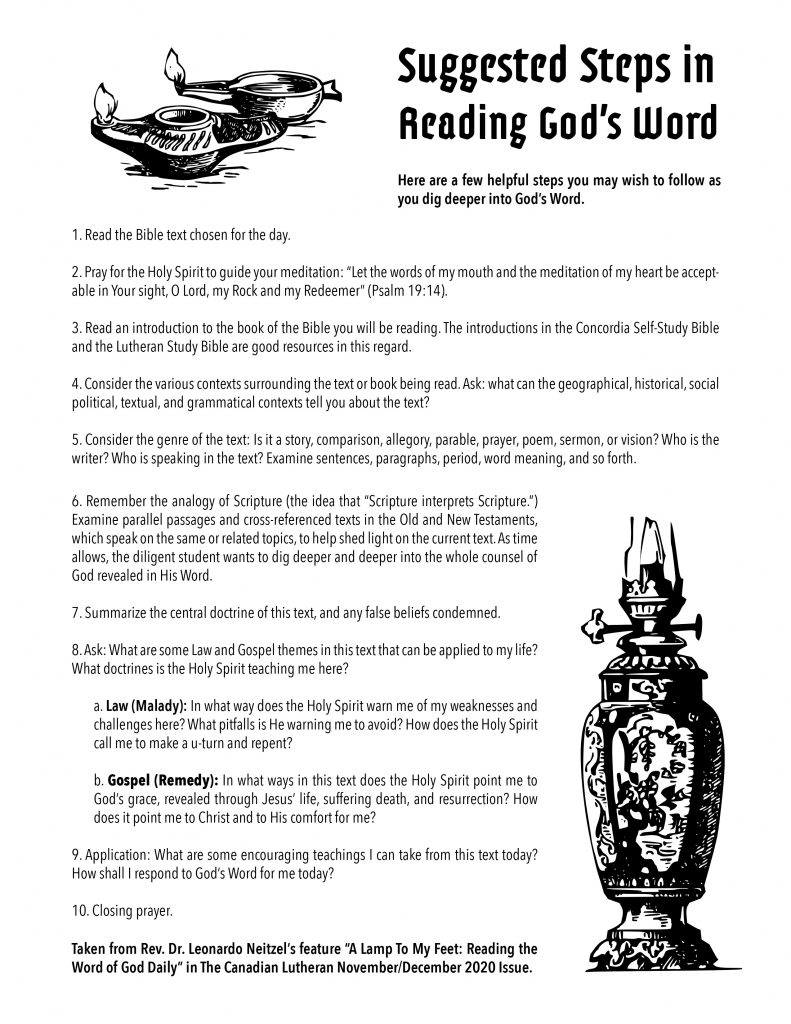A Lamp To My Feet: Reading the Word of God Daily
 by Leonardo Neitzel
by Leonardo Neitzel
Beginning in 2011, Lutheran Church–Canada (LCC) began publishing resources and encouraging individuals and congregations to read through the Bible yearly, biennially, or triennially. The theme of LCC’s national convention that year was “In Your Light We See Light” (Psalm 36:9). Several years later in 2017, LCC joined The Lutheran Church—Missouri Synod and the North American Lutheran Church in producing a joint three-year schedule of daily Bible readings which ran from 2018-2020.
During this time, many congregations and individuals have become newly engaged in Bible reading, with uplifting and gratifying outcomes.
The increase of Bible apps along with online Bible studies and devotional resources has been a blessing to young and old people alike, as they use their devices to study God’s Word. Electronic media has taken God’s Word to people outside and beyond the church. Just like the humble donkey which carried Jesus in His triumphal entry into Jerusalem, electronic media has proven a powerful tool for bring the Word of God into the lives of many.
Having the Holy Scriptures readily available in so many languages has helped countless people from many cultures to come to the knowledge of Jesus and walk in His Light. The church has also made good use of electronic Bibles in worship services and Bible studies. It has expanded her ministry of the Word and in mission. Christians have benefitted greatly from Bible apps in particular, especially during these critical times related to COVID-19.
With Advent and the new calendar of the Church year arriving, it is timely to consider our own journey and our family’s journey through God’s Word over the past three years, and to renew our commitment to restart our reading plan for the New Year.
There are several methods and plans for Bible reading. We are encouraged to read God’s Word regularly, to feed and drink from the Source of Life. We are nurtured and strengthened in faith, and the Holy Spirit causes us to grow in our Christian life and witness to stand on God’s truth and share it. We need to be reminded always that tools are just tools. These are useful as long as they bring us into God’s Word. Jesus says: “If you abide in My Word, you are truly My disciples, and you will know the truth, and the truth will set you free” (John 8:31-32).
Methods of Bible Reading
There is not just one way of studying God’s Word. Methods vary greatly. Some people choose to simply read portions of Scripture regularly; some take notes about the reading; others write down personal applications and prayers related to the day’s reading; and still others develop a more comprehensive practice as they survey the contextual, exegetical, and doctrinal elements involving the text.
LCC congregations can encourage small Bible study groups, either face-to-face or via electronic media such as Zoom or Skype. Some groups focus on the lessons for each Sunday of the church calendar. Others pursue thematic studies of the Scriptures, or follow published studies. These are a great start, and can be expanded by participants into personal study and reflection on the texts assigned for each day of the week of the lectionary readings. You can find these texts on pages 299-304 in the Lutheran Service Book.
There are many right ways to study Scripture. But there is also a wrong way. The wrong way is to approach the Bible without reverence and humility, relying more on your own understanding than on the power of the Word itself. The wrong way is when you distort God’s Word—for example, by taking a historical prophecy and assuming it’s personally about you. The wrong way is when you try to make Scripture say more or less than what it actually says—when you force it to accommodate to your worldview. God’s Word says what it says. It cannot be changed, added to, or subtracted from. It is God Himself speaking to us. “All Scripture is breathed out by God and profitable for teaching, for reproof, for correction, and for training in righteousness” (2 Timothy 3:16).
Suggested Steps in Reading God’s Word

Print & Share!
Here are a few helpful steps you may wish to follow as you dig deeper into God’s Word.
1. Read the Bible text chosen for the day.
2. Pray for the Holy Spirit to guide your meditation: “Let the words of my mouth and the meditation of my heart be acceptable in Your sight, O Lord, my Rock and my Redeemer” (Psalm 19:14).
3. Read an introduction to the book of the Bible you will be reading. The introductions in the Concordia Self-Study Bible and the Lutheran Study Bible are good resources in this regard.
4. Consider the various contexts surrounding the text or book being read. Ask: what can the geographical, historical, social political, textual, and grammatical contexts tell you about the text?
5. Consider the genre of the text: Is it a story, comparison, allegory, parable, prayer, poem, sermon, or vision? Who is the writer? Who is speaking in the text? Examine sentences, paragraphs, period, word meaning, and so forth.
6. Remember the analogy of Scripture (the idea that “Scripture interprets Scripture.”) Examine parallel passages and cross-referenced texts in the Old and New Testaments, which speak on the same or related topics, to help shed light on the current text. As time allows, the diligent student wants to dig deeper and deeper into the whole counsel of God revealed in His Word.
7. Summarize the central doctrine of this text, and any false beliefs condemned.
8. Ask: What are some Law and Gospel themes in this text that can be applied to my life? What doctrines is the Holy Spirit teaching me here?
a. Law (Malady): In what way does the Holy Spirit warn me of my weaknesses and challenges here? What pitfalls is He warning me to avoid? How does the Holy Spirit call me to make a u-turn and repent?
b. Gospel (Remedy): In what ways in this text does the Holy Spirit point me to God’s grace, revealed through Jesus’ life, suffering death, and resurrection? How does it point me to Christ and to His comfort for me?
9. Application: What are some encouraging teachings I can take from this text today? How shall I respond to God’s Word for me today?
10. Closing prayer.
Suggested Steps in Reading God's Word
Print & Share!
Challenging but Rewarding
Reading and meditating on God’s Word, and spending time in prayer and fellowship with God on a regular basis (either individually or corporately) requires discipline and perseverance. We know some of the challenges individuals and families face today as far as setting time aside for family devotion, the reading of Scripture, and prayer: work, children’s daily schedules, caring for a family member, and many other obligations can make it difficult to set time aside for much.
But time spent in God’s Word doesn’t make our lives more difficult. Instead, when we spend time in Scripture, we are reinvigorated to face the challenges of everyday life. We find we have more energy and encouragement to carry on with our chores. We do well to learn from the example of Martin Luther. Faced with the demanding schedule of his daily life, he wrote: “I have so much to do that I shall spend the first three hours in prayer.”
Examples abound of faithful Christians throughout history who have made meditation on God’s Word and prayer their regular routine. They found, as we will find, that this practice brings with it abundant blessings—both in this life and in the life to come. Make time for God’s Word. Shortsighted are those Christians who argue they cannot make time for the Lord of Life.
The first Psalm encourages us: “Blessed is the man . . . [whose] delight is in the law of the Lord, and on His law he meditates day and night. He is like a tree planted by streams of water that yields its fruit in its season, and its leaf does not wither. In all that he does, he prospers” (Psalm 1:1-3).
Only through God’s light are we made able to see light.
Conclusion
God’s discloses His Word to us in terms of Law and Gospel. Through His Law, He reveals and exposes our spiritual diseases, our sins and shortcomings in life. Through His Gospel, He shows us the remedy for that sin—the healing which flows from the cross of Jesus and His victorious resurrection. In His Law, God shows us the way of death eternal. In His Gospel, He shows us the way of eternal life. The Gospel of Jesus Christ is the power of God to all who believe.
Blessed are those who immerse themselves in God’s Word, who listen to the voice of Jesus and follow. Take to heart the promise Jesus made to the Samaritan woman at the well. He said to her: “Everyone who drinks of this water will be thirsty again, but whoever drinks of the water that I will give him will never be thirsty forever. The water that I will give him will become in him a spring of water welling up to eternal life” (John 4:13-14).
We find that water in the words of Scripture. May we be granted the same blessing.
———————
Rev. Dr. Leonardo Neitzel is Lutheran Church–Canada’s emeritus Executive for Missions and Social Ministry.



